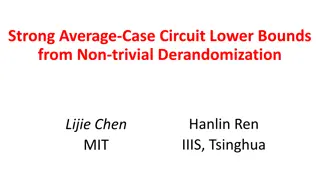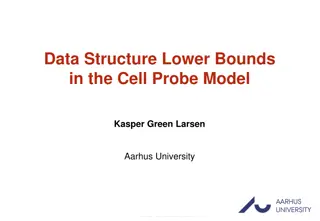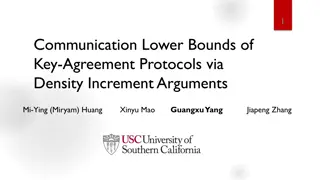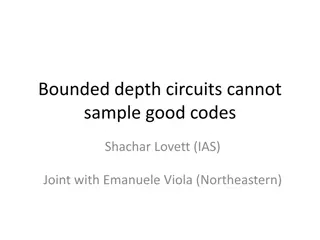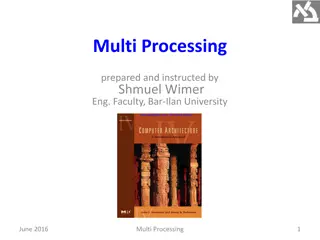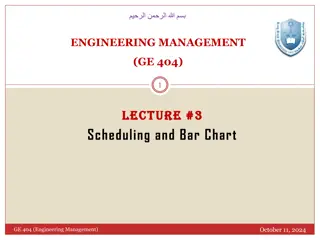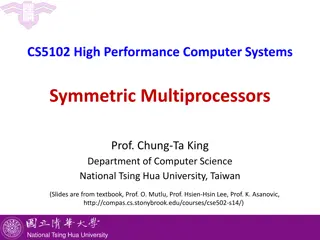Bounds for Global EDF Scheduling on Uniform Multiprocessors
Deadline tardiness, bounded tardiness, and task scheduling priority are explored in the context of global Earliest Deadline First (EDF) scheduling on uniform multiprocessors. The concept of observed tardiness and its mathematical constraints are also discussed, along with the impact on response times. The study presents mathematical proofs and visual representations to illustrate the principles and outcomes of the scheduling algorithms in different scenarios.
Download Presentation

Please find below an Image/Link to download the presentation.
The content on the website is provided AS IS for your information and personal use only. It may not be sold, licensed, or shared on other websites without obtaining consent from the author.If you encounter any issues during the download, it is possible that the publisher has removed the file from their server.
You are allowed to download the files provided on this website for personal or commercial use, subject to the condition that they are used lawfully. All files are the property of their respective owners.
The content on the website is provided AS IS for your information and personal use only. It may not be sold, licensed, or shared on other websites without obtaining consent from the author.
E N D
Presentation Transcript
Tardiness Bounds for Global EDF Scheduling Tardiness Bounds for Global EDF Scheduling on a Uniform Multiprocessor on a Uniform Multiprocessor Kecheng Yang James H. Anderson Dept. of Computer Science UNC-Chapel Hill
Tardiness Bounds Tardiness Bounds for Global EDF Scheduling for Global EDF Scheduling on a Uniform Multiprocessor on a Uniform Multiprocessor Kecheng Yang James H. Anderson Dept. of Computer Science UNC-Chapel Hill
Deadline Tardiness A job J with an absolute deadline at time d finishes at time f, has a tardiness of max{0, f-d}. Tardiness of a task: the maximum tardiness of any jobs of the task. Bounded tardiness: the tardiness of a task is not unboundedly increasing with the time. Bounded tardiness directly implies bounded response times.
i= (Ci,Ti) 1= 2= 3= (2,3) on 2 unit-speed processors Bounded Tardiness priority: 1 > 2 > 3 proc 1 proc 2 0 time 4 6 8 2 10
i= (Ci,Ti) 1= 2= 3= (2,3) on 2 unit-speed processors Bounded Tardiness priority: earliest-deadline-first (EDF) proc 1 proc 2 0 time 4 6 8 2 10
i= (Ci,Ti) 1= 2= 3= (2,3) on 2 unit-speed processors Bounded Tardiness Observed Tardiness is at most 1. Tardiness is mathematically proven to be at most 2. priority: earliest-deadline-first (EDF) proc 1 proc 2 0 time 4 6 8 2 10
Tardiness Bounds for Global EDF Scheduling Tardiness Bounds for Global EDF Scheduling on a on a Uniform Multiprocessor Uniform Multiprocessor Kecheng Yang James H. Anderson Dept. of Computer Science UNC-Chapel Hill
Uniform Platforms A uniform platform of m processors with speeds: {si}. n implicit-deadline sporadic tasks. An implicit-deadline sporadic task i= (Ci,Ti). Tiis the period, and relative deadline Di=Ti. Ciis the worst-case execution requirement. Utilization ui= Ci/Ti. Each task releases a sequence of jobs. i,jdenotes the jthjob of i. A job is ready if it is released but incomplete, and all of its predecessors have completed. Ci if s=2 Ci if s=1 time Ci 2 Ci 0
Feasibility Condition Sk: the sum of the k largest values in {si}. Uk: the sum of the k largest values in {ui}. A system is feasible, if and only if: Un Sm Uk Sk, for k = 1,2, , m-1
Tardiness Bounds for Tardiness Bounds for Global EDF Scheduling Global EDF Scheduling on a Uniform Multiprocessor on a Uniform Multiprocessor Kecheng Yang James H. Anderson Dept. of Computer Science UNC-Chapel Hill
Prior Results Both preemptive and non-preemptive global EDF schedulers guarantee bounded deadline tardiness for any feasible system on an identical multiprocessor. U. Devi and J. Anderson. Tardiness bounds for global EDF scheduling on a multiprocessor. In 26th RTSS, 2005.
Work-Conserving A work-conserving scheduler prevents the situation where at least one processor is idle and at least one task that has an incomplete job but is not scheduled. That is, work-conserving means whenever a task could be scheduled on an idle processor, it is scheduled. Global EDF is clearly a work-conserving scheduler.
Non-Preemptive Scheduling On identical multiprocessors, non-preemptive scheduling is well-defined. Once a job is scheduled, it continuously executes without preemption until it completes. On uniform multiprocessors, we further require that Once a job is scheduled, it continuously executes without preemption or migration until it completes. Non-preemptive scheduling means no preemption and no migration.
i= (Ci,Ti) 1= 2= 3= (2,3) on 2 unit-speed processors No Preemption and No Migration Bounded Tardiness Work-Conserving priority: earliest-deadline-first (EDF) proc 1 proc 2 0 time 4 6 8 2 10
Non-Preemptive Scheduling There exists a feasible system on a uniform platform where unbounded deadline tardiness is inevitable under any work-conserving non- preemptive scheduler.
Two processors: s1=3 and s2=1. A task is denoted as i=(Ci,Ti) 1=(4,2) releases its first job at time 0 and then releases jobs as soon as possible. 2=(4,2) releases its first job at time 1 and then releases jobs as soon as possible. 1,1 1,2 1,3 1,4 1,5 s1=3 Schedule Repeats 2,1 2,2 2,3 s2=1 0 time 4 6 8 10 2
Two processors: s1=3 and s2=1. A task is denoted as i=(Ci,Ti) 1=(4,2) releases its first job at time 0 and then releases jobs as soon as possible. 2=(4,2) releases its first job at time 1 and then releases jobs as soon as possible. 2,3 1,4 s1=3 1,1 2,1 1,2 2,2 1,3 2,4 1,5 2,5 Schedule Repeats 1,1 2,1 1,2 2,2 1,3 2,3 1,4 2,4 1,5 s2=1 0 time 4 6 8 2 10
Preemptive Global EDF If at most jobs are ready, then all ready jobs are scheduled; otherwise, the m ready jobs with earliest deadlines are scheduled. Schedule earliest-deadline jobs Migrations are allowed, by which the ready job with the kthearliest deadline is always scheduled on the kthfastest processor for any k. The earlier the deadline, the faster the processor
The Open Problem Under the preemptive Global EDF scheduler, is the deadline tardiness for every task probably bounded for any feasible system on a uniform multiprocessor? Un Sm Uk Sk, for k = 1,2, , m-1 Sk: the sum of the k largest values in {si}. Uk: the sum of the k largest values in {ui}.
Current Progress Yes, when the number of processors is limited to 2. Published result. Yes, when the number of processors is limited to 3. Very recent result, unpublished yet. For 4 or more processors, and for arbitrary processor number m, the problem is still open.
Thank you! Questions?
An important property for the analysis framework: if a job i,jcontinuously executes, it will complete within Titime units. i,j Ti This clearly holds for identical multiprocessors, because ui= Ci/Ti 1 and any processor has a speed of 1.
An important property for the analysis framework: if a job i,jcontinuously executes, it will complete within Titime units. s<ui i,j >Ti This may not hold for uniform multiprocessors, because a task may execute on a processor with a speed smaller than its utilization.
1stjob of i 2ndjob of i 1stjob of i 2ndjob of i




